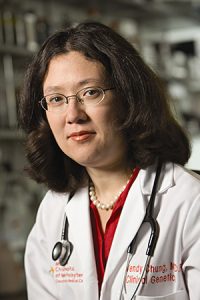- Aug. 10, 2018, 8:00 pm US/Central
- Fermilab Ramsey Auditorium
- Dr. Wendy Chung, Simons Foundation
- Tickets: $7
- Purchase tickets »
Autism is a common condition, affecting 1/68 individuals. There is significant heterogeneity across the autism spectrum that has made it difficult to understand the causes of autism. We will explore the current state of knowledge of what we know about the causes of autism and how such understanding can help to better understand the brain and behavior and develop better supports for individuals with autism.
Wendy Chung, M.D., Ph.D. is a clinical and molecular geneticist and the Kennedy Family Professor of Pediatrics and Medicine and the Director of Clinical Research for SFARI at the Simons Foundation. She received her B.A. in biochemistry and economics from Cornell University, her M.D. from Cornell University Medical College, and her Ph.D. from The Rockefeller University in genetics. Dr. Chung leads the Simons Foundation Powering Research for Knowledge (SPARK) study and Simons VIP study of genetic subtypes of autism. She directs the clinical and translational autism research portfolio at the Simons Foundation. She leads NIH funded research programs in human genetics across a range of genetic conditions as well as the Precision Medicine Resource in the Irving Institute At Columbia University. She has authored over 300 peer reviewed papers and 50 reviews and chapters in medical texts. She was the recipient of the American Academy of Pediatrics Young Investigator Award, the Medical Achievement Award from Bonei Olam, and a career development award from Doris Duke. Dr. Chung is renowned for her teaching and mentoring and received Columbia University’s highest teaching award, the Presidential Award for Outstanding Teaching. She was the original plaintiff in the Supreme Court case that overturned the ability to patent genes and served on the Institute of Medicine Committee on Genetic Testing. Dr. Chung enjoys the challenges of genetics as a rapidly changing field of medicine and strives to facilitate the integration of genetic medicine into all areas of health care in a medically, scientifically, and ethically sound, accessible, and cost effective manner.





